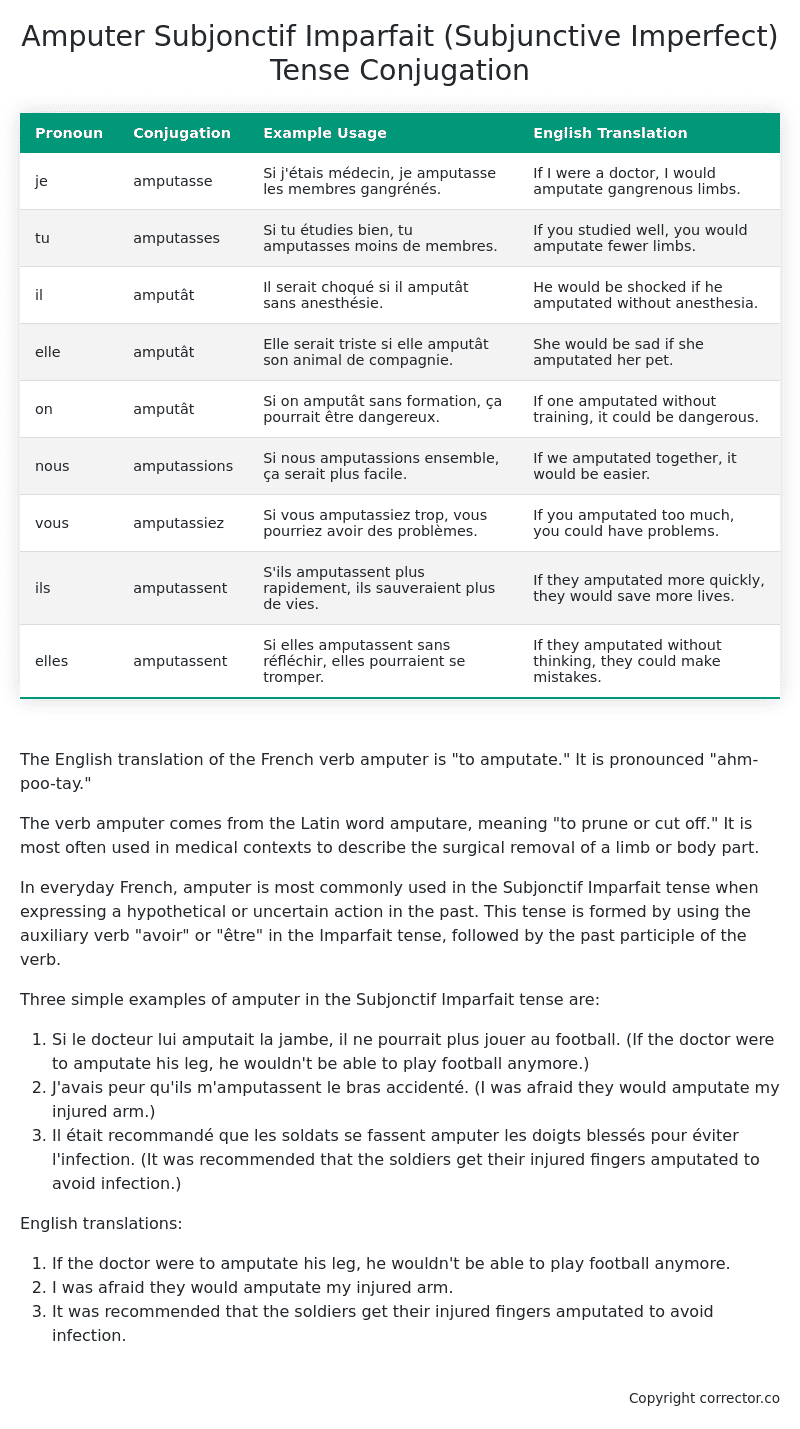Subjonctif Imparfait (Subjunctive Imperfect) Tense Conjugation of the French Verb amputer
Introduction to the verb amputer
The English translation of the French verb amputer is “to amputate.” It is pronounced “ahm-poo-tay.”
The verb amputer comes from the Latin word amputare, meaning “to prune or cut off.” It is most often used in medical contexts to describe the surgical removal of a limb or body part.
In everyday French, amputer is most commonly used in the Subjonctif Imparfait tense when expressing a hypothetical or uncertain action in the past. This tense is formed by using the auxiliary verb “avoir” or “être” in the Imparfait tense, followed by the past participle of the verb.
Three simple examples of amputer in the Subjonctif Imparfait tense are:
- Si le docteur lui amputait la jambe, il ne pourrait plus jouer au football. (If the doctor were to amputate his leg, he wouldn’t be able to play football anymore.)
- J’avais peur qu’ils m’amputassent le bras accidenté. (I was afraid they would amputate my injured arm.)
- Il était recommandé que les soldats se fassent amputer les doigts blessés pour éviter l’infection. (It was recommended that the soldiers get their injured fingers amputated to avoid infection.)
English translations:
- If the doctor were to amputate his leg, he wouldn’t be able to play football anymore.
- I was afraid they would amputate my injured arm.
- It was recommended that the soldiers get their injured fingers amputated to avoid infection.
Table of the Subjonctif Imparfait (Subjunctive Imperfect) Tense Conjugation of amputer
| Pronoun | Conjugation | Example Usage | English Translation |
|---|---|---|---|
| je | amputasse | Si j’étais médecin, je amputasse les membres gangrénés. | If I were a doctor, I would amputate gangrenous limbs. |
| tu | amputasses | Si tu étudies bien, tu amputasses moins de membres. | If you studied well, you would amputate fewer limbs. |
| il | amputât | Il serait choqué si il amputât sans anesthésie. | He would be shocked if he amputated without anesthesia. |
| elle | amputât | Elle serait triste si elle amputât son animal de compagnie. | She would be sad if she amputated her pet. |
| on | amputât | Si on amputât sans formation, ça pourrait être dangereux. | If one amputated without training, it could be dangerous. |
| nous | amputassions | Si nous amputassions ensemble, ça serait plus facile. | If we amputated together, it would be easier. |
| vous | amputassiez | Si vous amputassiez trop, vous pourriez avoir des problèmes. | If you amputated too much, you could have problems. |
| ils | amputassent | S’ils amputassent plus rapidement, ils sauveraient plus de vies. | If they amputated more quickly, they would save more lives. |
| elles | amputassent | Si elles amputassent sans réfléchir, elles pourraient se tromper. | If they amputated without thinking, they could make mistakes. |
Other Conjugations for Amputer.
Le Present (Present Tense) Conjugation of the French Verb amputer
Imparfait (Imperfect) Tense Conjugation of the French Verb amputer
Passé Simple (Simple Past) Tense Conjugation of the French Verb amputer
Passé Composé (Present Perfect) Tense Conjugation of the French Verb amputer
Futur Simple (Simple Future) Tense Conjugation of the French Verb amputer
Futur Proche (Near Future) Tense Conjugation of the French Verb amputer
Plus-que-parfait (Pluperfect) Tense Conjugation of the French Verb amputer
Passé Antérieur (Past Anterior) Tense Conjugation of the French Verb amputer
Futur Antérieur (Future Anterior) Tense Conjugation of the French Verb amputer
Subjonctif Présent (Subjunctive Present) Tense Conjugation of the French Verb amputer
Subjonctif Passé (Subjunctive Past) Tense Conjugation of the French Verb amputer
Subjonctif Imparfait (Subjunctive Imperfect) Tense Conjugation of the French Verb amputer (this article)
Subjonctif Plus-que-parfait (Subjunctive Pluperfect) Tense Conjugation of the French Verb amputer
Conditionnel Présent (Conditional Present) Tense Conjugation of the French Verb amputer
Conditionnel Passé (Conditional Past) Tense Conjugation of the French Verb amputer
L’impératif Présent (Imperative Present) Tense Conjugation of the French Verb amputer
L’infinitif Présent (Infinitive Present) Tense Conjugation of the French Verb amputer
Struggling with French verbs or the language in general? Why not use our free French Grammar Checker – no registration required!
Get a FREE Download Study Sheet of this Conjugation 🔥
Simply right click the image below, click “save image” and get your free reference for the amputer Subjonctif Imparfait tense conjugation!

Amputer – About the French Subjonctif Imparfait (Subjunctive Imperfect) Tense
Formation
Common Everyday Usage Patterns
Interactions with Other Tenses
Subjonctif Présent
Indicatif Passé Composé
Conditional
Conditional Perfect
Summary
I hope you enjoyed this article on the verb amputer. Still in a learning mood? Check out another TOTALLY random French verb conjugation!


